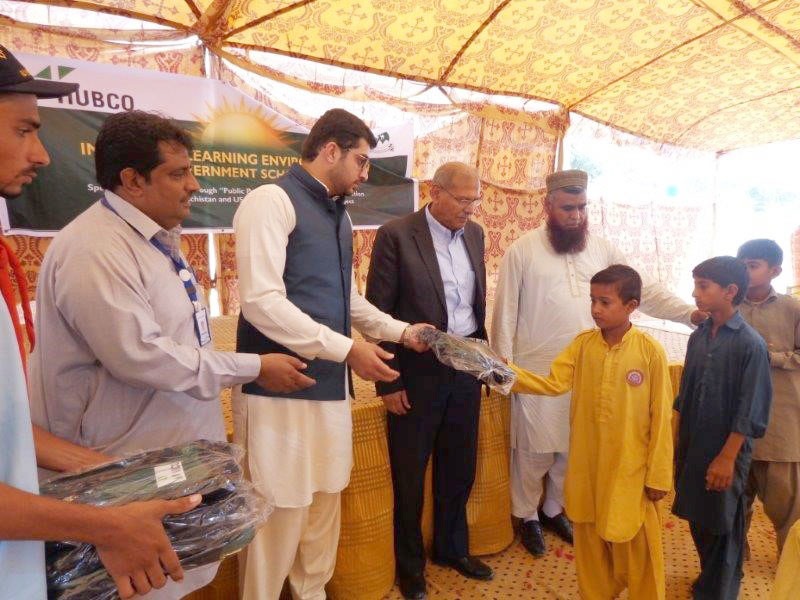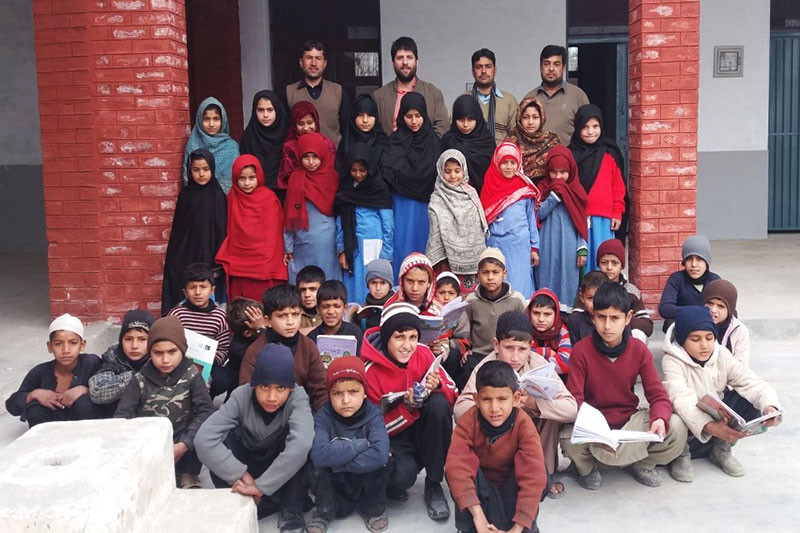Public-private partnerships boost education in Pakistan
By Noman ManzoorOctober 19, 2017
ISLAMABAD – From books and backpacks to classroom rehabilitation, private companies, including South Asia’s largest independent power producer HUBCO, are stepping up to support a culture of reading across the country.
To date, eight companies have formed partnerships with Pakistan Reading Project, an initiative which aims to improve the reading skills of 1.3 million children in grades 1 and 2 in public schools across the country. The project is funded by the U.S. Agency for International Development.
The private-public partnerships come at an opportune time when the country seeks to boost the educational outcomes of its millions of public school students.
“Public-private partnership is a pressing need of the time to promote the national agenda of quality education in public schools,” said Talha Saleem, Assistant District Commissioner of Hub, a city in Balochistan province, at the project partnership kickoff event last fall at the Government Boys High School in Lasbela district.

In the coastal Lasbela district in Pakistan’s most impoverished province of Balochistan, more than 6,200 students in 28 primary schools received new school bags, stationery and supplies through the partnership with HUBCO.
Guiding the Pakistan Reading Project’s public-private partnership strategy, Fayyaz Ahmed, Ph.D., Deputy Chief of Party, says, “Engaging corporations in developing local communities is vital, as it creates a win-win situation for both businesses and residents.”
“Parents are encouraged to send more children to school when support is provided to their kids in one form or the other,” he adds.
The Pakistan Reading Project supports provincial and regional departments of education to improve the quality of teaching and assessment of reading at the early grade level in public schools across Pakistan. It is implemented by the International Rescue Committee, in partnership with Creative Associates International, World Learning and the Institute of Rural Management.
“Engaging corporations in developing local communities is vital, as it creates a win-win situation for both businesses and residents. Parents are encouraged to send more children to school when support is provided to their kids in one form or the other.”
The project is developing alliances, like the one with HUBCO, with private sector partners on behalf of the Government of Pakistan as a way to mobilize and maintain social investment to improve reading outcomes in Pakistan’s public schools.
Leveraging private sector contributions to support education is a key priority of the Government of Pakistan, based on the 2009 National Education Policy.
And that policy priority is reaping practical benefits. To date, more than 19,000 students have benefited from the public-private-partnerships facilitated by the Pakistan Reading Project. Through these partnerships, the private sector has contributed $130,335 toward government schools.
Through trainings, research and taskforces in seven regions and provinces, the project is also working to build capacity among provincial and regional departments of education to continue to develop and sustain these alliances.
The Pakistan Reading Project has also partnered with Intel Pakistan to train 108 public school teachers on Information and Communications Technology (ICT) skills across five regions/provinces: Islamabad, Gilgit-Baltistan, Sindh, Azad Jammu Kashmir and Khyber Pakhtunkhwa. As part of Intel’s Education Initiative, the training was designed to enhance teachers’ competencies in the use of ICT in schools and their daily lives.
Naveed Siraj, Country Manager for Intel Pakistan Corporation, says this public private partnership is making a positive impact in classrooms and communities.
“Intel Pakistan is committed to making a difference in the lives of children and teachers through opportunities and interventions that help enhance their learning capabilities,” he says. “It has been our pleasure to have collaborated with the Pakistan Reading Project team.”
Since its independence, Pakistan has experienced strong economic growth and currently enjoys a robust corporate sector. However, widespread poverty and poor social sector service delivery continue to plague the country.
Many view the role of corporate social responsibility as critical to bridging the gap between the fiscal and institutional capacity of the government and the vast social needs of the country.
Businesses help improve classrooms and equip young learners
By channeling private support to government-operated schools, the Pakistan Reading Project and its partners aim to improve the quality of education within the public school system.
For example, in Balochistan province, another private partner, the Rotary Literacy Mission, is working closely with the education department to provide books for primary and higher grade students and establish and rehabilitate school libraries and classrooms in public schools.
Rotary has donated 2,550 books to the school libraries of 18 public schools in the Lasbela district, benefiting more than 5,000 students.
In Khyber Pakhtunkhwa province, other companies are joining hands with the Pakistan Reading Project to uplift public schools.
In the outskirts of Peshawar, City University is developing new classrooms at the government primary school, Garhi Sherdad No. 3, which needed urgent infrastructure improvements.

Working closely with the provincial education department, City University constructed and rehabilitated classroom and washroom facilities, as well as a courtyard and an overhead water tank, benefitting more than 118 primary students.
Head Teacher Shamshad Ahmad, who actively participated in the construction process, expressed his gratitude for the rehabilitation efforts.
“I am excited to see this school transformed into a neat and clean building,” he says. “I would like to thank the Pakistan Reading Project for taking this initiative. More such private sector partners should step forward to help local schools.”
In another initiative in Khyber Pakhtunkhwa, private partner Alpha Pipes is providing supplies and materials such as books, stationery, water coolers and shelves to the Government Girls Primary School, benefitting more than 350 students.
With multiple prospective partnerships in the pipeline, the Pakistan Reading Project looks forward to continuing to work with the public and private sectors to improve school environments and quality education for millions of students.
Fayyaz, of the Pakistan Reading Project, says the project is also working to ensure that these partnerships endure and continue to benefit the country’s young learners.
“Once the synergies and systems are established between the department of education and corporations, it’s likely that such support will continue to pour in even after the project closes–contributing directly or indirectly to higher enrollment,” he says.
Noman Manzoor is a Communications and Reporting Manager for the USAID-funded Pakistan Reading Project.

